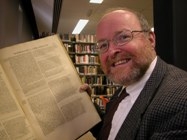Anglo-Norman grant

Professor David Trotter
01 February 2008
A former French president, Clemenceau, once memorably remarked that England was a French colony which had gone wrong. The evidence of French colonization is all around: amongst the visible traces of the Norman Conquest of 1066 are the castles and cathedrals which dot the landscape.
But another element, less visible and often forgotten, is the immense influence which the arrival of William the Conqueror and his supporters had on the subsequent development of the English language and, to a lesser extent, on the Celtic languages of the British Isles.
This is, at present, only imperfectly documented in even the Oxford English Dictionary, but a major research project in Aberystwyth is seeking to ensure a better understanding of 1066 and all that – at least as far as the language was concerned.
The Anglo-Norman Dictionary, which was started in 1947 and whose first edition was published between 1977 and 1992, is being fundamentally revised with support from the Arts and Humanities Research Council, which has put more than £800,000 already into a project which comprises the Dictionary itself (based in Aberystwyth under the direction of Professor David Trotter of the Department of European Languages) and an associated collection of digitized texts (now totalling some 8 million words) which has been constructed under the direction of Professor Andrew Rothwell of the Department of French in Swansea University.
The Dictionary revision, which itself started in 1989, has already generated two substantial printed volumes of nearly 1200 pages (covering A-E.). Since 2003, an exclusively online revision has covered F-H, and now Professor Trotter has been awarded a very substantial further grant (£873,669) to continue the process up to the letter M. So, by 2012, half the original dictionary will have been comprehensively revised.
To judge by what has been done so far, this means that it will be more than three times the size of the original, and in particular, that it will be able to cover all sorts of areas of language which the first version of the dictionary was unable to consider.
These include, notably, legal texts; scientific literature; and the vast amount of administrative documentation which survives from the period between the Norman conquest and the end of the fifteenth century. For Anglo-Norman was in use throughout this period, at least in writing, alongside Latin.
Professor Trotter said: “English (Anglo-Saxon) substantially disappeared from writing after the conquest and did not re-emerge until the thirteenth century. Anglo-Norman, the language of the conquerors, took its place in just the same way that Anglo-Norman nobles and prelates displaced their Anglo-Saxon predecessors.”
“That is how and why this particular form of French came to have such an influence on the English language: more than 50% of the vocabulary of modern English comes from this source. The amount of French which has become part of English far outweighs the amount of franglais in French – the much-feared invasion of modern French by English.”
“The entirety of the legal process, the offices of state, a good deal of everyday vocabulary and (and this is often forgotten) substantial numbers of dialect words which have now gone out of use in the standard language, derived directly from Anglo-Norman.”
“The Anglo-Norman Dictionary, in its revised form, will make possible a comprehensive reassessment of this element of the impact of the Norman Conquest, and will make visible an aspect of the enduring influence of the Anglo-Normans which is every bit as important as the castles and cathedrals which they built. As a result, Clemenceau was not altogether wrong when he said that English was just badly-pronounced French,” he added.
Anglo-Norman Dictionary website (free): http://www.anglo-norman.net.
Professor David Trotter is Head of the Department of European Languages at Aberystwyth University. He teaches History of the French language, modern French sociolinguistics, Romance Philology, and dialectology. His current research work focuses on historical French linguistics, medieval French (especially non-literary texts), historical dialectology, especially eastern French, and the Anglo-Norman Dictionary. Further details of the Department are available online at http://www.aber.ac.uk/eurolangs/.
The Arts and Humanities Research Council
Arts and Humanities Research Council - Each year the AHRC provides approximately £90 million from the Government to support research and postgraduate study in the arts and humanities, from archaeology and English literature to design and dance. In any one year, the AHRC makes approximately 700 research awards and around 1,500 postgraduate awards. Awards are made after a rigorous peer review process, to ensure that only applications of the highest quality are funded. Arts and humanities researchers constitute nearly a quarter of all research-active staff in the higher education sector. The quality and range of research supported by this investment of public funds not only provides social and cultural benefits but also contributes to the economic success of the UK.
Further information is available online at www.ahrc.ac.uk



